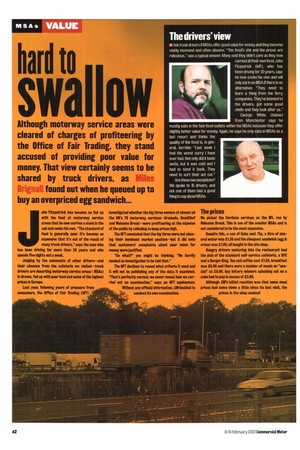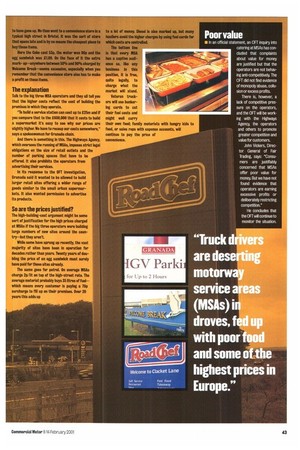lard to
Page 44

Page 45

If you've noticed an error in this article please click here to report it so we can fix it.
Iswa ow
Although motorway service areas were
pleared of charges of profiteering by he Office of Fair Trading, they stand accused of providing poor value for oney. That view certainly seems to be shared by truck drivers, as Miles rignall found out when he queued up to buy an overpriced egg sandwich...
ohn Fitzpatrick has become so fed up with the food at motorway service areas that he now carries a stove In the cab and cooks his own. "The standard of food is generally poor It's become so expensive that it's out of the reach of many truck drivers," says the man who has been driving for more than 20 years and who spends five nights out a week.
Judging by the comments of other drivers—and their absence from the cafeteria we visited—truck drivers are deserting motorway service areas ( MSAs) hi droves, fed up with poor food and some of the highest prices in Europe.
Last year, following years of pressure from consumers, the Office of Fair Trading (OFT) investigated whether the big three owners of almost all the UK's 76 motorway services—Oranada, RoadChef and Welcome Break—were profiteering at the expense of the public by colluding to keep prices high.
The OFF concluded that the big three were not abusing their dominant market position—but it did note that customers' complaints about poor value for money were justified.
"So what?" you might be thinking. "We hardly needed an investigation to be told that."
The OFT declines to reveal what criteria it used and it will not be publishing any of the data it examined. "That's perfectly normal; we never reveal how we carried out an examination," says an OFT spokesman. Without any official information, CMdecided to conduct its own examination.
The prices
We picked the Gordan° services on the M5, run by Welcome Break. This is one of the smaller MSAs and is not considered to be the most expensive.
Despite this, a can of Coke cost 75p, a litre of mineral water was £1.39 and the cheapest sandwich (egg & cress) was 11.95; all bought in the site shop.
Hungry drivers venturing into the restaurant had the pick of the standard self-service cafeteria, a KFC and a Burger King. Tea and coffee cost £1,50, breakfast was £5.99 and there were a number of meals on "special" at £4.99. Any lottery winners splashing out on a cake had to pay in excess of 12,60.
Although 0Ars initial reaction was that some meal prices had come down a little since its last visit, the prices in the shop seemed
to have gone up. We then went to a convenience store in a typical high street in Bristol. It was the sort of store that opens late and Is by no means the cheapest place to buy these items.
Here the Coke cost 53p, the water was 50p and the egg sandwich was 21.09. On the face of it the extra markup—anywhere between 50% and 90% charged by Welcome Break—seems excessive, especially when you remember that the convenience store also has to make a profit on these items.
The explanation
Talk to the big three MSA operators and they all tell you that the higher costs reflect the cost of building the premises in which they operate.
"To build a service station can cost up to 125m and if you compare that to the 1600,000 that It costs to build a supermarket its easy to see why our prices are slightly higher. We have to recoup our costs somewhere," says a spokeswoman for Granada chain.
And there is something in this. The Highways Agency, which oversees the running of MSAs, imposes strict legal obligations on the size of retail outlets and the number of parking spaces that have to be offered. It also prohibits the operators from advertising their services.
In its response to the OFT investigation, Granada said it wanted to be allowed to build larger retail sites offering a wider range of goods similar to the small urban supermarkets. It also wanted permission to advertise its products.
So are the prices justified?
The high-building-cost argument might be some sort of justification for the high prices charged at MSAs if the big three operators were building large numbers of new sites around the country—but they aren't.
While some have sprung up recently, the vast majority of sites have been in operation for decades rather than years. Twenty years of doubling the price of an egg sandwich must surely have paid for these sites already.
The same goes for petrol. On average MSAs charge 2pflit on top of the high-street rate. The average motorist probably buys 35 litres of fuel— which means every customer is paying a 70p surcharge to fill up on their premises. Over 20 years this adds up to a lot of money. Diesel is also marked up, but many hauliers avoid the higher charges by using fuel cards for which costs are controlled.
The bottom line ,
is that every MSA ); has a captive audience so, like any' business in this position, it is free, quite legally, to charge what the market will stand.
Veteran truckers will use hunkering cards to cut their fuel costs and might well carry their own food; family motorists with hungry feed, or sales reps with expense accounts, will continue to pay the price of convenience.
































































































